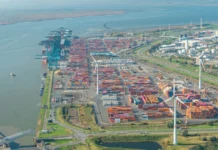
Container shipping lines are using their online platforms to shift shippers away from freight forwarders and move them into a direct relationship with the carrier, according to freight forwarding sources in Europe and India.
The reports from freight forwarders claim that COSCO, CMA CGM, Maersk and Hapag-Lloyd are all looking to gain direct access to shippers either directly through digital platforms or through the issuance of house bills of lading.
One forwarder complained that carriers were “evacuating” empty containers form their country and leaving them with no empty equipment while they were then also looking to make it difficult for freight forwarders to serve their customers.
One European forwarder told Container News, that COSCO Logistics competes directly with her company and that if they were to ship cargo for a client from China to the United Arab Emirates, ordinarily they would issue two bills of lading, one to the line and a “house bill of lading” that does not go to the carrier. The house bill of lading contains the name of both the shipper and consignee.
According to the forwarder COSCO is now issuing its own house bills of lading, “that is limiting our opportunities,” said the forwarder, who added that Maersk was making similar moves, “We are trying to avoid using both Maersk and COSCO,” she added.
Meanwhile, in the Asia Pacific region, logistics resource management company GoComet has said that the carriers are promoting their online digital platforms to bypass freight forwarders, naming both Maersk and Hapag-Lloyd in this instance.
According to Gautam Jain, CEO of GoComet, the carriers have been encouraging shippers to book directly with the lines through online portals for some time and some customers have been lost in this way.
However, Jain also pointed out that, “Many shippers prefer to use freight forwarders because they get a better, more personalised service, so if there are problems they can talk to a person and the credit terms are significantly better with forwarders,” he said.
Major forwarder Keuhne+Nagel saw no difficulties with Maersk’s moves, however, with Otto Schacht, the forwarders’ global head of seafreight, saying that the forwarder had competed with Maersk for 20 to 30 years, “but we love each other”.
According to Schacht Maersk has been making these moves for some time, “I know that other forwarders have had problems,” conceded Schacht, but he said Kuehne+Nagel have such large volumes that they must spread their cargo around a “core of volume carriers,” he said.
No carrier had responded at the time of going to press.
Nick Savvides
Managing Editor




